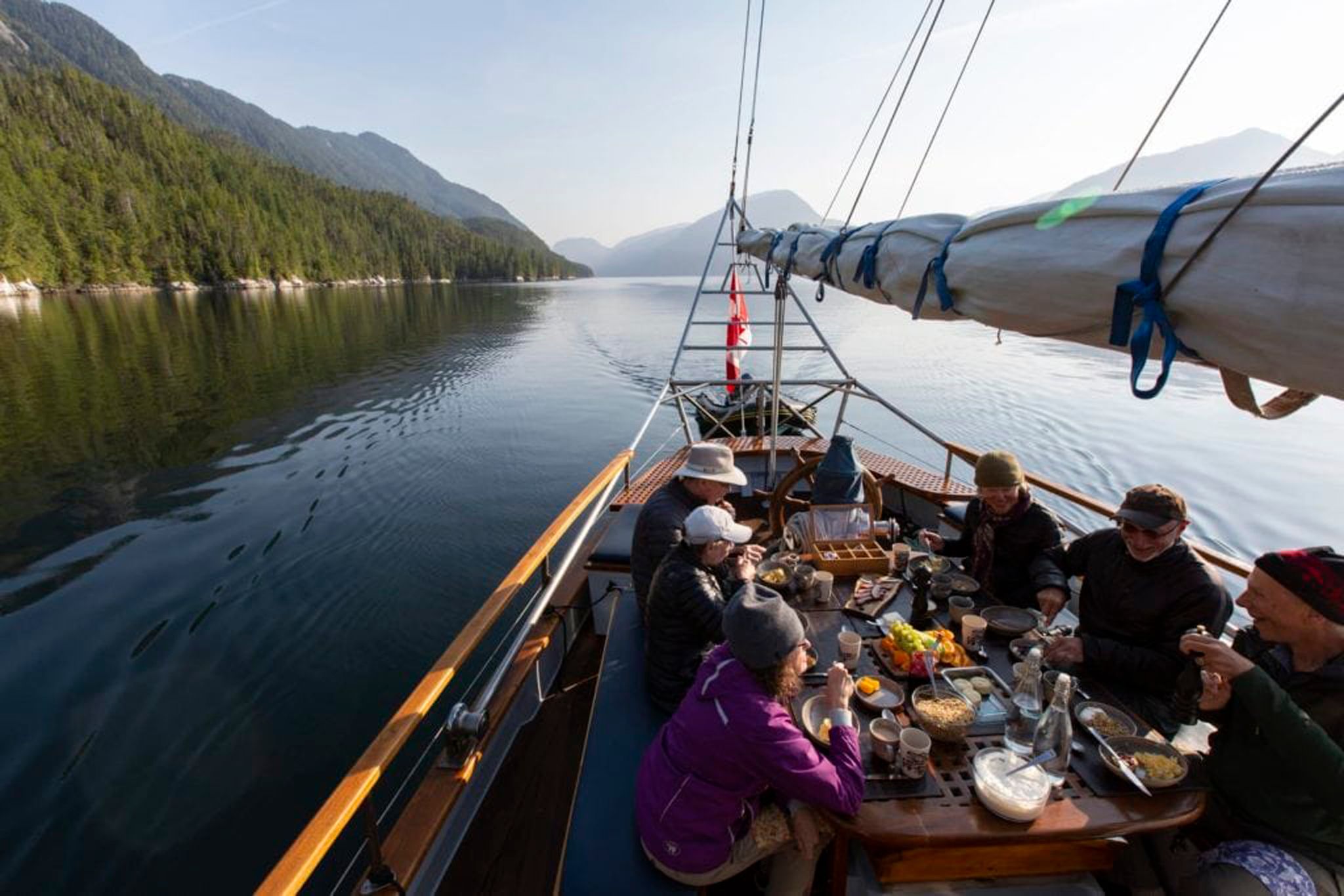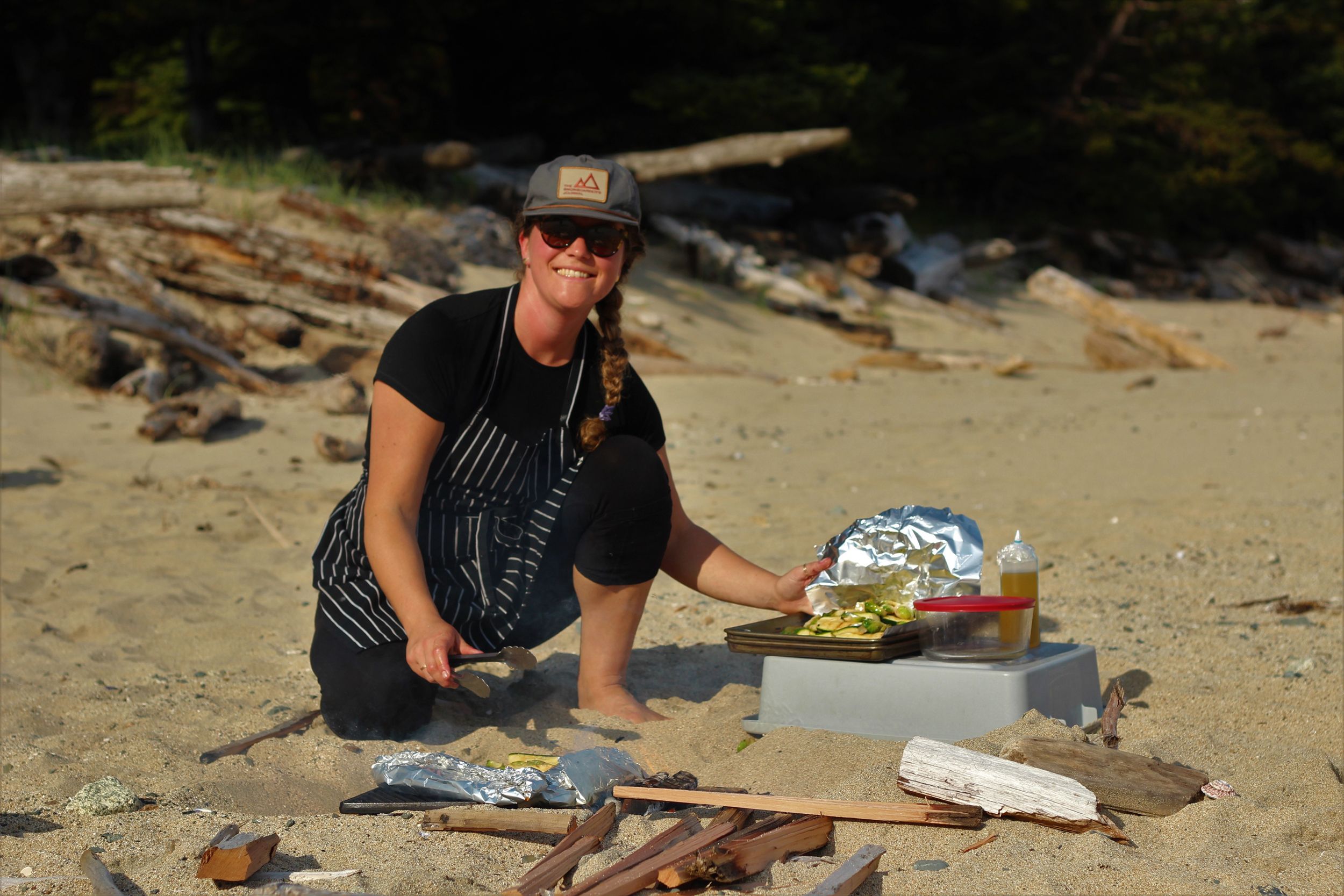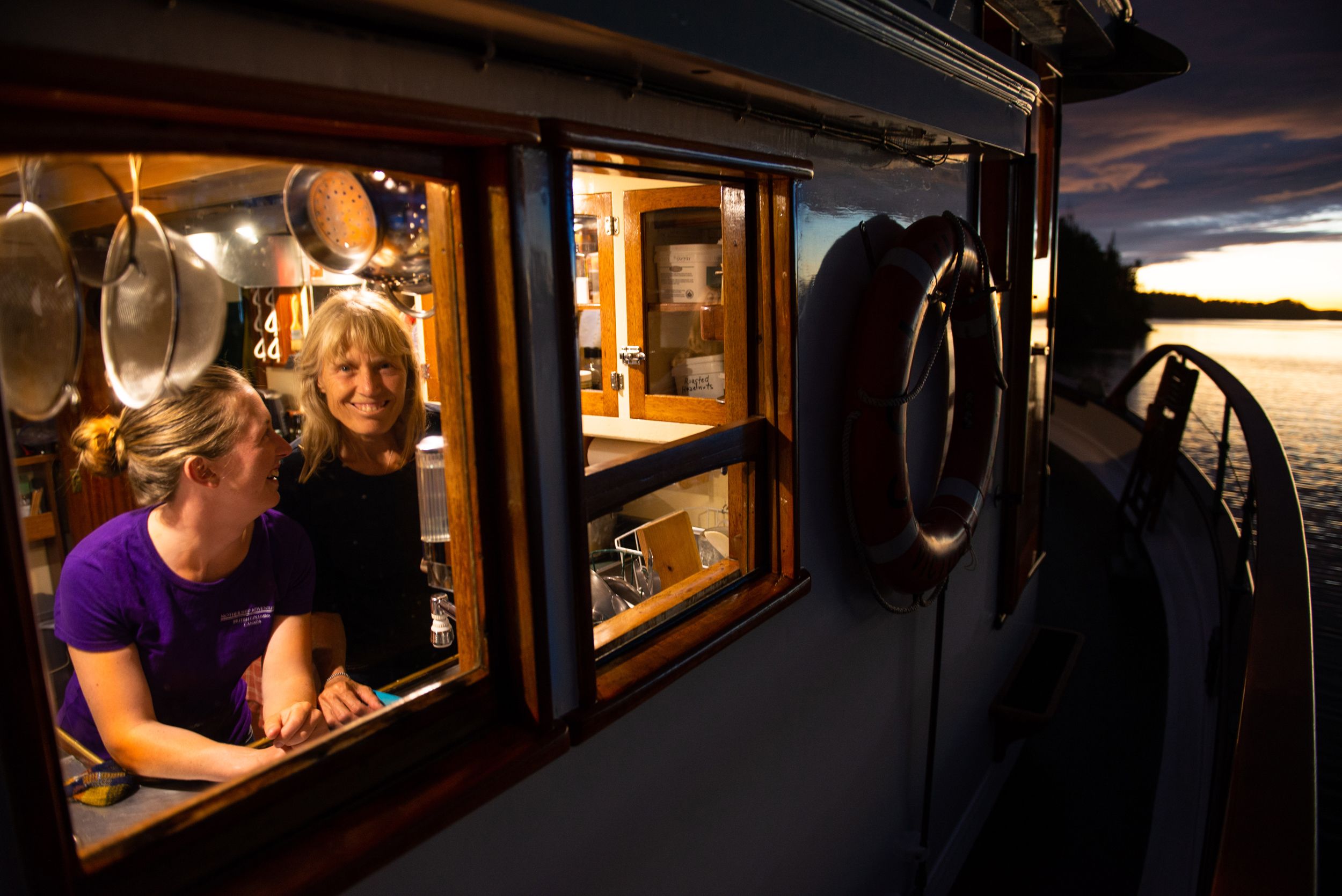Three Ships, Three Chefs

Photo by Joe Crawford
If you think a chef’s job is challenging, imagine doing it on a moving platform off our wild coast.
From spring through fall, some of B.C.’s most talented and passionate chefs do just that, boarding small ships and heading to sea, often for weeks at a time. For Diana Newson, Marylene Savage and Fern Kornelsen, working at least part of the year on an expedition-style ship provides them a lifestyle they love. They’re not just making dinners, but breakfast, lunch and snacks for six to 24 guests during what might be a once-in-a-lifetime experience. It helps that all three get to work on some of the most loved and historic vessels in B.C. and get to see places many of us can only dream about.
Diana’s first job as a chef for Outer Shores Expeditions came about unexpectedly, when the person scheduled to work the eight-day tour in Haida Gwaii called in sick.
“I just jumped on a plane and flew up there, and literally the guests were already on board,” she recounts with a chuckle. “I got a round of applause!”
Diana grew up and lives in the Comox Valley where her father and grandfather were both commercial fishermen, so she’s spent a lot of time on boats. Still, that didn’t prepare this Red Seal chef for cooking on Passing Cloud, a 70-foot wooden schooner where guests are welcome to walk through the galley (the ship’s kitchen) on their way to the back deck. This can be hazardous, especially if she’s carrying a hot pan or a knife. At the start of a trip, she’ll often tell guests, “I’m here to feed you, but we have to work together.”
Still, she loves being within sight and earshot of guests and wouldn’t have it any other way.
“Just hearing the groans of ‘Oh, my God, this is so good.’ You don't get to experience that in a restaurant, whereas I get to see it first-hand when they're sitting on the deck.”
But being a chef on a small ship requires you to be not only organized and flexible, but willing to go with the flow. Diana recalls a day in the Great Bear Rainforest when guests were determined to see a Spirit Bear. They went to shore after an early breakfast and were gone all day, despite meals waiting for them on the boat.
“As a chef, this is your art form and you're like, ‘I want to serve it warm, or I want it to look beautiful.’”
In the end, guests got to see a bear and Diana got to practice being patient. “It’s kind of like it doesn't matter how flustered you get. You’re like, ‘Oh, wait, look out the window.’”

Diana, photo by James Thompson Photography
For Marylene Savage, seasonal work is something she and her husband both enjoy. She works mostly summers, three weeks on, followed by three weeks off, while her husband works mostly winters as a backcountry ski guide in the Kootenays. It means one of them is always home with their son.
Marylene joined Maple Leaf Adventures in 2016, one of the largest eco-tourism operators on the coast with three ships. She chooses to work exclusively on Swell, an 88-foot converted tugboat built in 1912.
Maple Leaf Adventures has built relationships with local food suppliers up and down the coast, even sourcing locally fermented kombucha. Their galleys are particularly well equipped, including a full-size refrigerator, stove, dishwasher and barbecue on Swell.
Still, Marylene knows the best-laid plans can go awry. “On my last trip,” she recounts, “I ordered 30 buns for soup [from a store in Campbell River], and I got 30 bags of buns, and I ended up with something like 200 buns!”
Another time, glass jars of made-from-scratch panna cotta landed on the floor when the fridge door suddenly flew open. “Ten minutes before dinner I had to make an emergency dessert!” Fortunately, she had some mangoes in the freezer. “And if you put frozen mangoes in a blender, they become a kind of sorbet.”
Marylene’s biggest challenge is meeting the needs of all kinds of eaters, be it vegetarian, pescatarian, vegan, gluten-free, you-name-it, often all at the same time. “Out of six crew members there's probably five of them that need something special, then there’s always a couple of guests.”
On the upside, she sees mealtimes as an opportunity to educate guests about the importance of choosing wild, sustainably harvested seafood as well as plant-based meals. “I try to serve one vegetarian or vegan meal per day,” she says, “to promote eating less animal protein but also to showcase that eating vegetarian can be nourishing and satisfying.”
It’s the spectacular window views and desire to be in nature that inspired Fern Kornelsen and her family to buy Mothership Adventures, a kayak touring company, in 2005, along with the 68-foot wooden “mothership” Columbia III.
Fern never trained as a chef, learning on the job instead. She often tests new recipes on the crew in April during the annual sanding, painting and varnishing of the ship at its dock near Quadra Island. “They’ll say ‘Yeah, bring this one on,’ or ‘No, we don’t really like this one.’”
Fern sources mostly organic ingredients in bulk for the entire season while buying fresh prawns from a neighbour with a fishing boat, and salmon from her daughter Farlyn who owns a commercial salmon troller with her partner.
Her biggest challenge is finding fresh fruit and veggies at the last minute at remote locations such as Bella Bella, where the only store may not have what she needs. “So, you run back to the boat and call one of the new crew flying in the next day and say, ‘We need 15 avocadoes or a case of mangos.’”
In recent years, Fern’s two daughters take turns as chef (Farlyn is also a captain while Miray is also a kayak guide and runs the office!) but Fern still loves being on the boat, especially at the end of the season in the Great Bear Rainforest.
“Some people don’t like the rain, but it’s so peaceful,” she says. “You’re in a quiet cove, snuggled in. You can hear the rain on the boat and see the bears. It’s amazing.”
Perhaps what’s even more amazing is how these chefs create mouth-watering meals day in, day out, no matter the weather, the remoteness, the distractions of wildlife, the demands of guests and crew. They’re all part of the job they love.

Photo by Tavish Campbell




